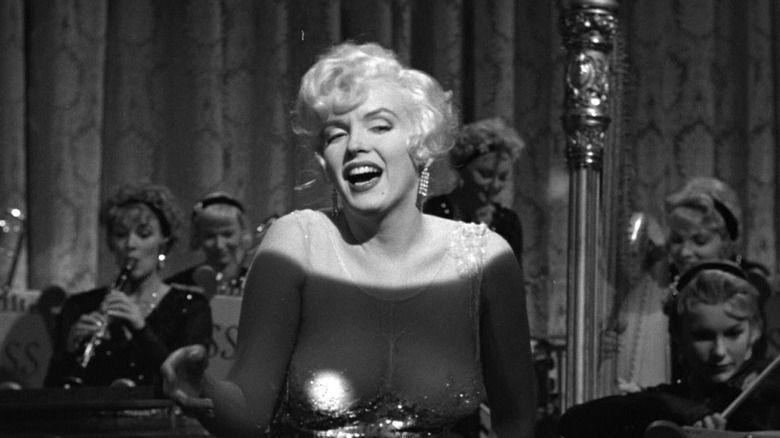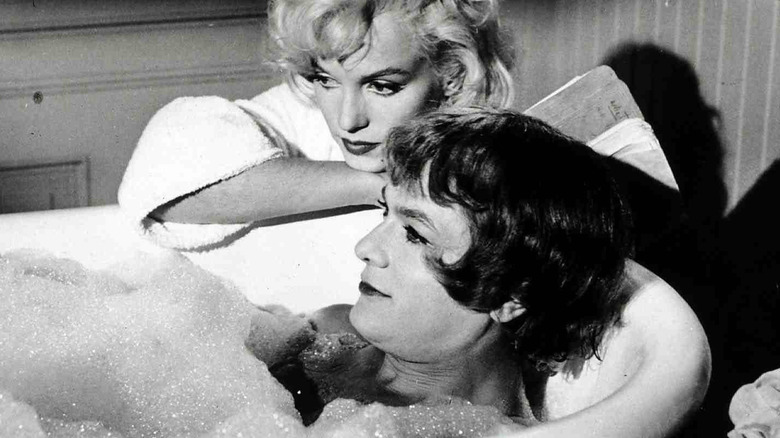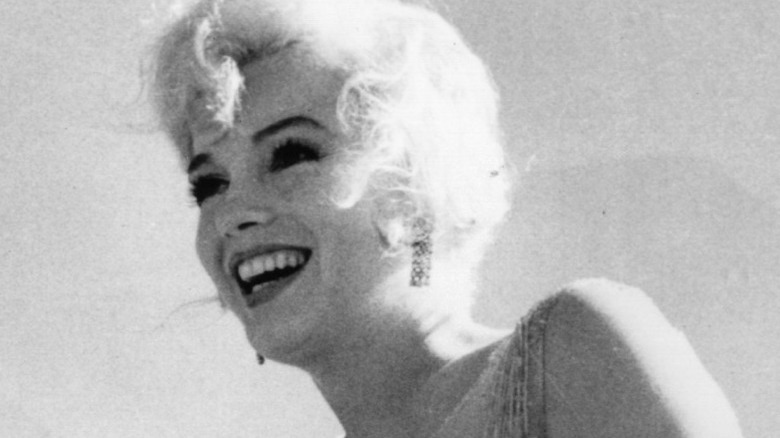Why Some Like It Hot Was Banned In Kansas
It's a super popular comedy that grossed big at the box office, arguably one of the greatest American films of all time, and even the rare '50s Hollywood film to turn the male gaze on itself. Though the plot sounds twee now, it was about as subversive as comedy got in its day. "Some Like It Hot" follows the foibles of two down-on-their-luck musicians (Tony Curtis and Jack Lemmon) who witness a mob killing and flee to Florida, posing as women in an all-female band fronted by Sugar Kane (Marilyn Monroe).
The movie features no shortage of gender-bending and homoerotic comedy. But not all of America was thrilled with the drag-fueled, titillating laughs of Billy Wilder's black-and-white classic when it premiered in 1959. Some like it hot, indeed, but some didn't like it at all. As The Take reported, the state of Kansas banned the film altogether upon its release, claiming the film's content was "too disturbing for Kansans." But the real reason behind the ban might surprise you.
Simply no adverse reaction at all
In the 1950s, Hollywood's restrictive "Hays Code" was still in effect. The code imposed rules for the onscreen depiction of, among other things, violence and sexuality. In 1959, United Artists released "Some Like It Hot" to rave reviews. Complete with cross-dressing, gangsters, and innuendo (Monroe's quip about "the fuzzy end of the lollipop" among the most memorable), the movie flew in direct defiance of the code's conservative attitude towards sex and gender. While it's now known as a Marilyn Monroe vehicle, Billy Wilder's first choice for the part of Sugar Kane was "White Christmas" waif Mitzi Gaynor, while Frank Sinatra was at one point considered for Jack Lemmon's dual role of Daphne/Jerry.
But while the Hays Code was becoming increasingly obsolete, deviating from its guidelines did not come without consequences from outside groups that valued them. On March 5, 1959, the Reverend Thomas F. Little wrote to Production Code Administration Director Geoffrey Shurlock, quoting the Catholic League of Decency's reaction to the recently released "Some Like It Hot."
"'This film, though it purports to be a comedy, contains screen material elements that are judged to be seriously offensive to Christian and traditional standards of morality and decency," he wrote. "Furthermore, its treatment dwells almost without relief on gross suggestiveness in costuming, dialogue and situations.'" Shurlock was more liberal than many of his PCA predecessors, though, and on March 18th, he shot back, "Not a single reviewer has been in the slightest way critical of this film, or questioned either its morality or its taste. So far there is simply no adverse reaction at all; nothing but praise for it as a hilariously funny movie."
Kiss and Tell
But it ultimately wasn't the Catholic League's condemnation –- nor any other organization's -– that caused Kansas to ban the film. Nor was it the many moments in which same sex attraction, via the main characters' cross-dressing, was not just hinted at, but (particularly in the case of Sugar and Joe-as-Josephine's poignant onstage kiss near the end of the film) seemingly endorsed. Rather, it was a depiction of heterosexual conquest, one of the film's (and arguably Monroe's) most iconic love scenes, that lead Kansas to bar it from theaters.
When Sugar boards the yacht that Joe/Josephine, now masquerading as oil tycoon "Junior," is pretending to own, she comes onto him under the auspices of kissing lessons. As Mental Floss notes, it was this scene, and United Artists' refusal to edit it from the film, that resulted in the statewide ban.
While Kansas may have given the film the crook back in 1959, since then it's Monroe & Co. who have gotten the last laugh (literally). In addition to being nominated for six Academy Awards, the movie was named one of the American Film Institute's 100 Greatest American Movies of All Time, and even claimed the top spot on the 100 Funniest Movies of All Time list. The Sunflower State may have passed on this gender-bending classic the first time around, but, to quote the film's memorable closing line, "Nobody's perfect."


